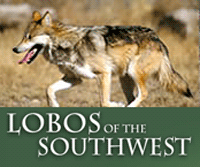For Immediate Release, October 7, 2024
Contact:
Greta Anderson, Western Watersheds Project, (520) 623-1878; This email address is being protected from spambots. You need JavaScript enabled to view it.
Michael Robinson, Center for Biological Diversity, (575) 313-7017, This email address is being protected from spambots. You need JavaScript enabled to view it.
Claire Musser, Grand Canyon Wolf Recovery Project, (928) 202-1325, This email address is being protected from spambots. You need JavaScript enabled to view it.
Flagstaff Wolf Removal Violates Endangered Species Act, Conservationists Warn
FLAGSTAFF, Ariz.—Three conservation groups today notified state and federal agencies that ongoing efforts to trap and relocate Mexican gray wolves west of Flagstaff violate the Endangered Species Act. The wolves, known as the Kendrick Peak pack, have been thriving in this area near the Grand Canyon since at least June.
“These tenacious Mexican wolves belong right where they are, so we’re putting wildlife officials on notice that they’ll be breaking the law if they try to relocate them,” said Michael Robinson, a senior conservation advocate at the Center for Biological Diversity. “Instead of trapping and removing the Kendrick Peak pack, state and federal officials should be doing everything they can to ensure that Mexican wolves recover.”
Mexican wolves living north of Interstate 40 are fully protected under the Endangered Species Act, including its ban on trapping and other harm. Today’s notice advises the USDA’s Wildlife Services and Arizona Game and Fish Department that they lack any permission to trap the Kendrick Peak wolf family.
The only relevant permit authorizes the trapping and relocation of Mexican wolves that have dispersed from what is called the Mexican Wolf Experimental Population Area. That area encompasses all of Arizona and New Mexico south of I-40 to the Mexico border.
The permit’s authorization to trap or move wolves does not apply to wolves in the vicinity of Kendrick Peak because their origins are not known.
“It’s entirely possible that these wolves were born to parents who have been living undetected outside of the experimental population area,” said Greta Anderson, deputy director of Western Watersheds Project. “The vast and wild Grand Canyon ecoregion is perfect habitat for wolves but the agencies insist on keeping wolves south of Interstate 40 for wholly political reasons.”
The Kendrick Peak wolf family is being trapped for alleged conflict associated with public lands grazing allotments. No efforts to protect the cattle from predation have been implemented on these allotments, and the cattle are scheduled to be removed from the allotments at the end of October. The livestock industry is compensated for losses due to wolf predation.
"Wolves are essential to the ecological health of the Grand Canyon ecoregion and should be allowed to find territories naturally,” said Claire Musser, executive director of the Grand Canyon Wolf Recovery Project. “Instead of translocation, we should work with communities to prevent conflict and foster a culture of tolerance and respect for these vital predators.”
Trapping risks injury to the endangered wolves, even when done by government agencies. At least 17 Mexican gray wolves have died as a direct result of agency trapping and handling since 1999. Moreover, the notice explained that allowing Mexican wolves to expand their range northward into the Grand Canyon ecoregion would further their conservation as the Endangered Species Act requires.
The Center for Biological Diversity, Western Watersheds Project and the Grand Canyon Wolf Recovery Project filed today’s notice. The Endangered Species Act requires such a written notice of the violation as a prerequisite to filing a lawsuit.
Mexican gray wolf photo available for media use with appropriate credit: Jim Clark/USFWS. Image is available for media use.
###






